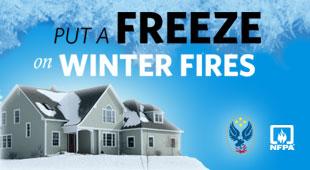| By Web Team | |
| January 7, 2015 | |
| As the weather of winter continues to set in this week with freezing temperatures, the Cutchogue Fire Department along with the United States Fire Administration (USFA) would like remind you that about 3,500 Americans die each year in fires and about 20,000 are injured. Here is a list of safety tips to stop a winter fire, before it starts: Make sure wood stoves are properly installed away from combustible surfaces, have good floor supports, and have proper ventilation so that the smoke can exit the home safely. Never use flammable liquids (such as gasoline) to start a fire or keep one going. Make sure your space heaters have an emergency shut off in case they tip over. ONLY use the fuel recommended by the manufacturer. Never refill a space heater while it is on or still hot. Refuel heaters outside, away from the house. Kerosene heaters are not allowed in many areas—check before you use one. Have your furnace and chimney professionally inspected every year and cleaned, if necessary. Chimney tar build-up is a common cause of chimney fires. Use a glass or metal screen in front of your fireplace to stop sparks from setting nearby carpets or furniture on fire. Never thaw frozen pipes with a blow torch or other open flame. Use hot water or a laboratory tested device, such as a hair dryer. Dispose of hot ashes in covered metal containers and place the containers away from the house. Never use the stove or oven to heat your home. Be prepared for a fire: One of the best ways to protect yourself and your family is to have a working smoke alarm that can sound fast for both a fire that has flames, and a smoky fire that has fumes without flames. It is called a "Dual Sensor Smoke Alarm." A smoke alarm greatly reduces your chances of dying in a fire. Make and practice a home fire escape plan and set a meeting place outside. Make sure everyone in your family knows at least two (2) escape routes from their bedrooms. To learn more on how you can prevent fires and fire please visit: http://www.usfa.dhs.gov/ |
|
